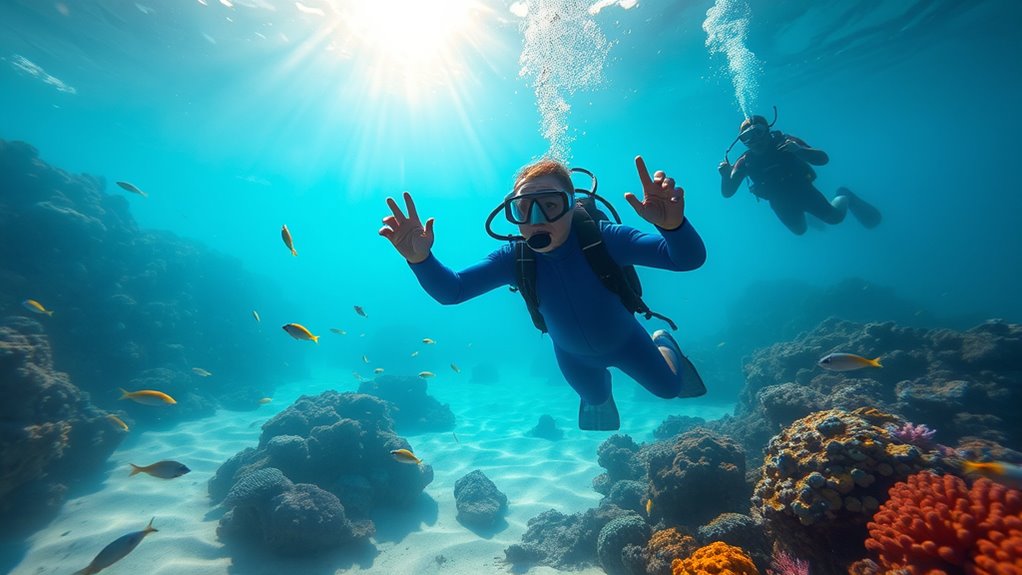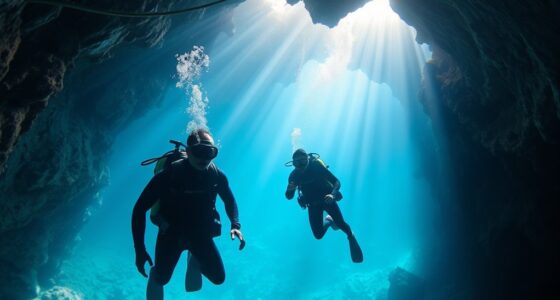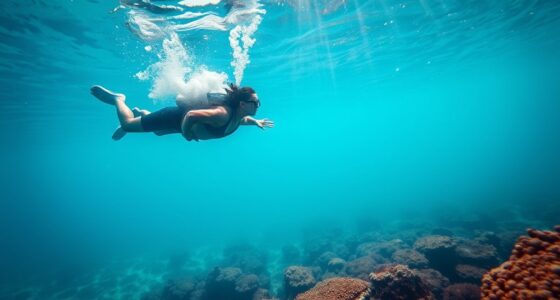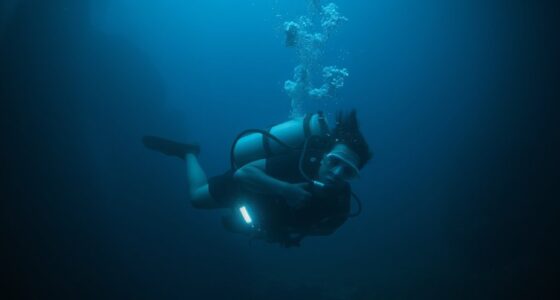Open water diving certification is vital for your safety and confidence as a beginner. It opens doors to underwater exploration, connects you with a community of divers, and equips you with essential skills like equipment management and navigation. You’ll learn to handle your gear effectively, ensuring a comfortable diving experience. Plus, you’ll get the chance to explore vibrant coral reefs and shipwrecks worldwide. There’s so much more to discover about this exciting journey ahead.
Key Takeaways
- Open Water Diving Certification ensures safe and confident diving experiences, opening access to diverse underwater exploration opportunities.
- Essential diving equipment includes a wetsuit, regulator, tank, and BCD, all crucial for safety and comfort underwater.
- Underwater navigation skills are vital for safely exploring unfamiliar waters and enhance overall diving enjoyment and confidence.
- Certification allows you to dive with a buddy globally, participate in dive trips, and explore vibrant coral reefs and shipwrecks.
- Building a strong support network and understanding your equipment are key to enjoying and succeeding in your diving journey.
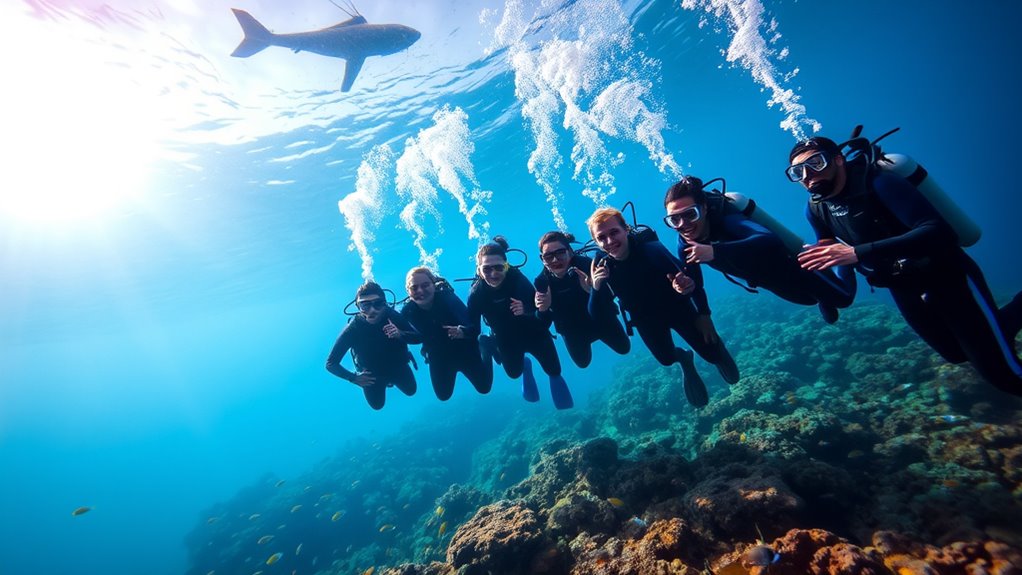
If you’ve ever dreamed of exploring the vibrant underwater world, getting an Open Water Diving Certification is your ticket to adventure. This certification isn’t just a piece of paper; it opens up a realm of possibilities for you to experience the beauty of coral reefs, marine life, and the tranquility of being submerged in the ocean. You’ll learn the essential skills needed to dive safely and confidently, making your underwater excursions memorable and enjoyable.
Before you dive in, it’s crucial to understand the dive equipment you’ll be using. You won’t just grab a mask and fins; you’ll need to familiarize yourself with a full set of gear. This includes a wetsuit, buoyancy control device (BCD), regulator, tank, and weight system. Each piece plays a vital role in ensuring your safety and comfort underwater. As you train for your certification, instructors will guide you through the process of selecting, adjusting, and maintaining your dive equipment. Knowing how to manage your gear will enhance your experience and help you feel at ease while exploring the depths.
Understanding your dive equipment is essential for safety and comfort underwater, from wetsuits to regulators and tanks.
Another key component of your training is underwater navigation. This skill is essential for diving in unfamiliar waters, allowing you to find your way back to your entry point or explore specific sites without getting lost. Your instructors will teach you how to use natural references, like the position of the sun or the layout of the seabed, to orient yourself. You’ll also learn to use a compass, which can be invaluable when diving in expansive areas with limited visibility. Mastering underwater navigation not only boosts your confidence but also makes your dives more enjoyable. In addition to navigation skills, it’s important to develop a strong support network of friends and family for emotional support during your diving journey.
Once you’ve completed your training, you’ll have the ability to dive with a buddy anywhere in the world, provided the conditions are safe. With your certification, you can join dive trips, explore new locations, and meet fellow diving enthusiasts. The adventures are endless, from exploring vibrant coral reefs teeming with life to swimming through shipwrecks that tell stories of the past.
Frequently Asked Questions
Can I Dive Without a Certification?
No, you can’t dive without a certification. Diving requires proper training to guarantee your safety and the safety of others. Using dive equipment without understanding how to operate it can lead to dangerous situations. While certification costs may seem high, they’re an essential investment in your safety and skills. Once you’re certified, you’ll gain confidence and knowledge, making your diving experiences much more enjoyable and secure.
How Long Does the Certification Process Take?
The certification process can feel like it takes forever, but it usually wraps up in about three to five days of training. You’ll immerse yourself in learning about diving equipment and meet certification prerequisites, which typically include classroom sessions and open water dives. Most courses are designed to be engaging and efficient, so you’ll be ready to explore underwater wonders in no time. Just stay focused, and you’ll be certified before you know it!
What Should I Wear for Open Water Diving?
For open water diving, you’ll want to wear the right dive gear to stay comfortable and safe. Start with a well-fitting wetsuit selection that matches the water temperature; it’ll provide insulation and protection. Don’t forget to include accessories like booties, gloves, and a hood if it’s colder. Make sure your mask, snorkel, and fins fit snugly as well. Proper gear guarantees you enjoy your dive while staying warm and protected underwater!
Are There Age Restrictions for Certification?
Yes, there are age restrictions for certification. Most agencies set a minimum age of 10 or 12 years for open water diving certification, allowing younger divers to train with a parent or guardian. If you’re under 18, you’ll usually need a signed parental consent form. It is crucial to check with the specific diving organization you’re interested in, as requirements can vary. Enjoy exploring the underwater world when you’re ready!
What if I Have a Medical Condition?
If you have a medical condition, it’s vital to get medical clearance before diving. Many conditions, like asthma or heart issues, can pose serious risks underwater. Your health considerations should always come first, so consult with a doctor experienced in diving medicine. They’ll evaluate your condition and determine if you’re fit to dive. Remember, safety is essential, and it’s better to err on the side of caution for your well-being.
Conclusion
Getting your open water diving certification isn’t just about learning to dive; it’s about joining a community of adventurers. You might’ve heard that diving is just for thrill-seekers, but the truth is, it’s for anyone curious about the underwater world. From vibrant coral reefs to mesmerizing marine life, you’ll find peace and connection beneath the surface. So, gear up and take the plunge—your underwater journey awaits, and who knows what incredible experiences lie ahead!

